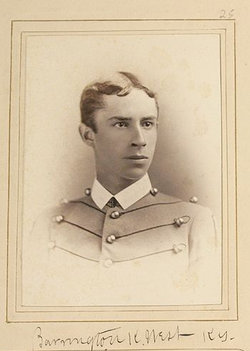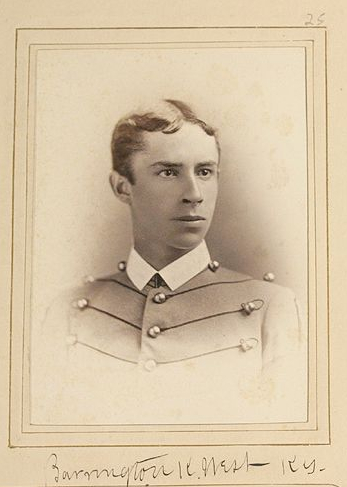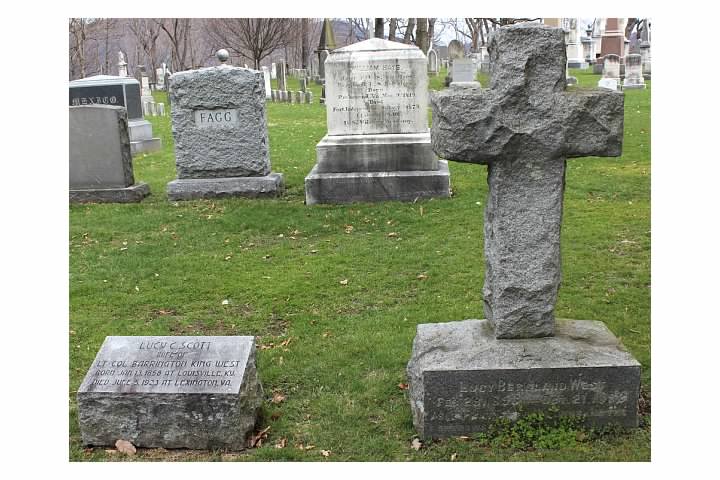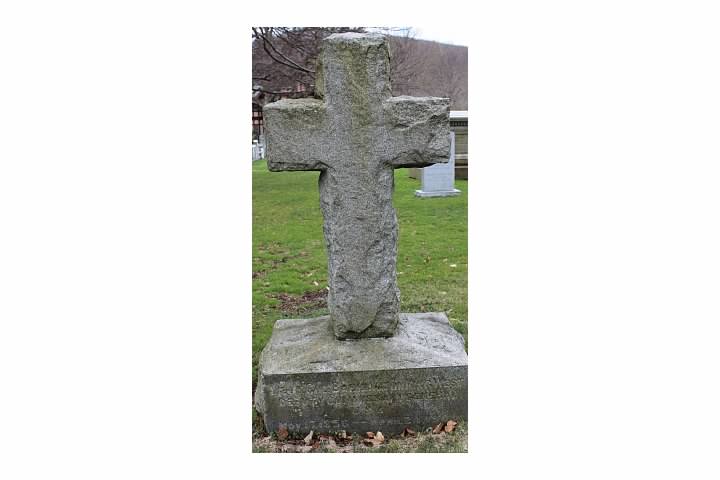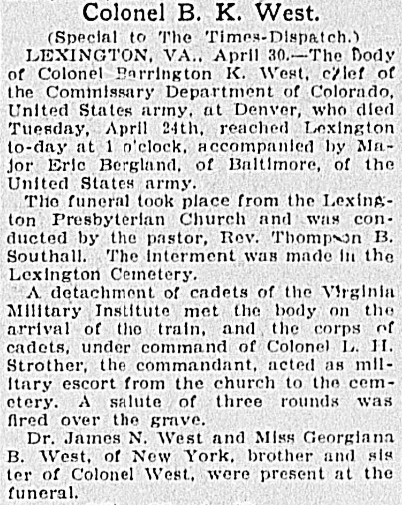- - - - - - - - - - - - - - - - - - - - -
Barrington King West was born on November 17th, 1856, in the State of Kentucky, and entered the United States Military Academy at West Point, New York, in 1878. He was to have graduated at the State College of Kentucky in June of 1878, but upon applying for the appointment to West Point was informed that the appointment would be competitive, whereupon he left the State College, giving up the immediate prospect of a literary degree to prepare for the examination. He had no one to coach him for this examination but won the appointment over twenty-one competitors. His preliminary education as obtained at the public schools in Louisville, Kentucky, and at the private school situated on his mother's farm, Russell's Cave.
He reported as a Cadet at West Point in June 1878, from the district represented by the Honorable Joseph Blackburn. His immediate predecessor was Brigadier-General J. Franklin Bell, Chief of Staff U. S. Army, who graduated as Colonel West entered the Academy. Because of the initial letter of his name Colonel West was enrolled near the bottom of a large class; but by faithful and honest effort worked his way up until he finally graduated with credit in a small class, noted less for scholarship, however, than for the close attachment with which its members adhered together in the many trials that beset them during their efforts to graduate. In all difficulties "Beck" West's judgment was sound and his advice good. He was older and wiser than most of us and was usually on the side of law and order. He at once took a leading social position in his own class and his soldierly qualities were soon recognized by the authorities at the Academy for whenever chevrons were worn by the class, West's name was a prominent one among the appointments; nor can I ever recall that he ever suffered the fate, which befell his nearest friends, of being reduced to the rank for some boyish escapade.
On graduation Lieutenant West selected the Cavalry and was assigned to Troop "B," Sixth Calvary, serving in Arizona. En route to their frontier stations several of his classmates were invited to stop off and visit him at his mother's home, Russell Cave, near Lexington, Kentucky. None who were fortunate enough to be there will ever forget the charming hospitality among the refined and lovely women of this typical Kentucky plantation. Like so, many of its kind it has passed into alien hands, but the memory of this true Southern home can never fade.
The Sixth Calvary was serving actively against Apache Indians when Lieutenant West joined on October 1st, I882, at Fort Apache, Arizona, on the White Mountain Indian Reservation. He was on detached service scouting under General George Crook and Major Biddle and performed other arduous and dangerous service well calculated to bring out the soldierly qualities of such a man and his service was creditable. His regiment was transferred to New Mexico and Colorado in 1884, Troop "B" taking station at Fort Lewis, Colorado. "In the field with 34 enlisted men in pursuit of party of hostile Ute Indians, and encountered them on the 15th of July, 1884, at Wannington Canon; result, one horse killed, returned to post July 26th, 1884; distance marched, 418 miles." The record, from which this is taken, fails to show that the range of the rifles with which the Indians were armed, was greater than that of the Springfield carbine with which the Cavalry had to fight them. For distinguished services on the frontier Troops "B" of the Fourth and Sixth Cavalry, commanded by Captains H. W. Lawton and George S. Anderson, were selected to garrison Fort Myer, Va., under the command of Major Louis H. Carpenter, a distinguished Indian fighter, Lieutenant West reported with his Troop.
Fort Myer was a show post and a soldier and gentleman like West could not fail to be an ornament to the place and his service there was a credit to himself, the Cavalry and the Army. To no, part of my service do I look back with more pleasure than to that with Colonel West at Fort Myer, Va. For the greater part of the time we occupied jointly a double set of quarters, each on his own side; until our respective families temporarily deserted us, when we joined forces and lived in perfect accord and with pleasure and benefit to me from intimate association with such a friend.
From Fort Myer, Va., Colonel West's duties took him to Wyoming and to the Yellowstone National Park; then to West Point, N. Y., 1893, as Acting Commissary of Subsistence of that post. Appointed Assistant Professor of History, U. S. Military Academy, August 28th, 1894, and was Assistant Professor of Law, August I3th, 1896, to August I3th, 1897. Relieved from duty at U. S. Military Academy, August, 1897, and after leave of absence, joined at Fort Myer, Va. Appointed Captain Commissary of Subsistence February 28th, 1898. His transfer to the Subsistence Department was a distinct loss to the Cavalry and a corresponding gain to his new department. As Commissary of Subsistence he served at the following stations and performed the duties indicated:
"Purchasing Commissary, New Orleans, La., March 1898 to November 1899; Chief Commissary, Department of the Missouri and Purchasing Commissary, Omaha, Nebraska, November 1899, to January 1901; Assistant to the Commissary-General, Washington, D. C., January 1901; Depot Commissary, Manila, Philippine Islands, March 1901, to August 1902; Assistant to the Commissary-General, Washington, D. C., October 1902 to July 1903; Chief Commissary, Department of the Colorado, and Purchasing Commissary, Denver, Colorado, July 1903, to April 1906, date of his demise."
On January 10th, 1902, Colonel Sanger, Inspector-General, Division of the Philippines, in his report paid Major West the following compliment: "Major West is an excellent officer in every respect, and a model Commissary, and the condition of the depot reflects great credit on him and his assistants."
On April 4th, 1903, the Commissary-General, in presenting names of officers who performed -especially efficient service and were fitted for detail to the General Staff, mentioned "Major B. K. West, an excellent, intelligent and efficient officer, capable of doing work on the General Staff Corps, or indeed anywhere. Reliable always."
To whatever field he was called, his services were always faithful to the United States, loyal to his superiors, and true to his conception of soldiery conduct. His gentle nature and bearing was apt to deceive those who did not know the brave spirit beneath. During the reorganization of the depot in Manila his successful efforts at reform angered the dishonest contractors, one of whom, supported by a Paymaster of questionable character, came to Major West's office to take him to task. Major West listened quietly to the complaints, abuse and threats until he thought it had gone far enough when he pointed the way to the door with a service revolver, nor did the contractor consider the order of his going. The Paymaster, meantime, was having a nervous chill on the nearest chair. The reforms were accomplished in spite of personal threats and anonymous letters.
Major West's health was much impaired by his service in Manila. After his return it became necessary for him to undergo a serious operation, from the effects of which and of the climate of Manila, he was a long time in recovering. His station in Denver had been most beneficial in restoring his health, his letters were cheerful and full of hope; when like a bolt from a clear sky came the news that he had died suddenly of pneumonia. Respected by all, loved by many, he was taken in the fullness of his manhood and usefulness.
While still a Cadet he became engaged to Miss Lucy Scott, of Kentucky, and they were married soon after his graduation. Like many army wives, she was a true helpmate and faithful companion in his many wanderings and vicissitudes incident to an Army life, for this she was repaid by loving devotion 'to herself and their children, all of whom survive to mourn their irreparable loss.
An affectionate and dutiful son and brother; a devoted husband and father, an honorable and gallant soldier, a tried and faithful friend; a credit to his Alma Mater, family and friends, he died as he had lived, true to his-birth and breeding. a chivalrous Southern gentleman.
The life of Colonel West might serve as a model for any Kentucky youth and we of Kentucky have reason to be proud and grateful for the fame he won and the life he led. The official order will describe him as "one whose service will ever stand as a model of all that is highest in the soldier's profession."
- - - - - - - - - - - - - - - - - - - - -
Barrington King West was born on November 17th, 1856, in the State of Kentucky, and entered the United States Military Academy at West Point, New York, in 1878. He was to have graduated at the State College of Kentucky in June of 1878, but upon applying for the appointment to West Point was informed that the appointment would be competitive, whereupon he left the State College, giving up the immediate prospect of a literary degree to prepare for the examination. He had no one to coach him for this examination but won the appointment over twenty-one competitors. His preliminary education as obtained at the public schools in Louisville, Kentucky, and at the private school situated on his mother's farm, Russell's Cave.
He reported as a Cadet at West Point in June 1878, from the district represented by the Honorable Joseph Blackburn. His immediate predecessor was Brigadier-General J. Franklin Bell, Chief of Staff U. S. Army, who graduated as Colonel West entered the Academy. Because of the initial letter of his name Colonel West was enrolled near the bottom of a large class; but by faithful and honest effort worked his way up until he finally graduated with credit in a small class, noted less for scholarship, however, than for the close attachment with which its members adhered together in the many trials that beset them during their efforts to graduate. In all difficulties "Beck" West's judgment was sound and his advice good. He was older and wiser than most of us and was usually on the side of law and order. He at once took a leading social position in his own class and his soldierly qualities were soon recognized by the authorities at the Academy for whenever chevrons were worn by the class, West's name was a prominent one among the appointments; nor can I ever recall that he ever suffered the fate, which befell his nearest friends, of being reduced to the rank for some boyish escapade.
On graduation Lieutenant West selected the Cavalry and was assigned to Troop "B," Sixth Calvary, serving in Arizona. En route to their frontier stations several of his classmates were invited to stop off and visit him at his mother's home, Russell Cave, near Lexington, Kentucky. None who were fortunate enough to be there will ever forget the charming hospitality among the refined and lovely women of this typical Kentucky plantation. Like so, many of its kind it has passed into alien hands, but the memory of this true Southern home can never fade.
The Sixth Calvary was serving actively against Apache Indians when Lieutenant West joined on October 1st, I882, at Fort Apache, Arizona, on the White Mountain Indian Reservation. He was on detached service scouting under General George Crook and Major Biddle and performed other arduous and dangerous service well calculated to bring out the soldierly qualities of such a man and his service was creditable. His regiment was transferred to New Mexico and Colorado in 1884, Troop "B" taking station at Fort Lewis, Colorado. "In the field with 34 enlisted men in pursuit of party of hostile Ute Indians, and encountered them on the 15th of July, 1884, at Wannington Canon; result, one horse killed, returned to post July 26th, 1884; distance marched, 418 miles." The record, from which this is taken, fails to show that the range of the rifles with which the Indians were armed, was greater than that of the Springfield carbine with which the Cavalry had to fight them. For distinguished services on the frontier Troops "B" of the Fourth and Sixth Cavalry, commanded by Captains H. W. Lawton and George S. Anderson, were selected to garrison Fort Myer, Va., under the command of Major Louis H. Carpenter, a distinguished Indian fighter, Lieutenant West reported with his Troop.
Fort Myer was a show post and a soldier and gentleman like West could not fail to be an ornament to the place and his service there was a credit to himself, the Cavalry and the Army. To no, part of my service do I look back with more pleasure than to that with Colonel West at Fort Myer, Va. For the greater part of the time we occupied jointly a double set of quarters, each on his own side; until our respective families temporarily deserted us, when we joined forces and lived in perfect accord and with pleasure and benefit to me from intimate association with such a friend.
From Fort Myer, Va., Colonel West's duties took him to Wyoming and to the Yellowstone National Park; then to West Point, N. Y., 1893, as Acting Commissary of Subsistence of that post. Appointed Assistant Professor of History, U. S. Military Academy, August 28th, 1894, and was Assistant Professor of Law, August I3th, 1896, to August I3th, 1897. Relieved from duty at U. S. Military Academy, August, 1897, and after leave of absence, joined at Fort Myer, Va. Appointed Captain Commissary of Subsistence February 28th, 1898. His transfer to the Subsistence Department was a distinct loss to the Cavalry and a corresponding gain to his new department. As Commissary of Subsistence he served at the following stations and performed the duties indicated:
"Purchasing Commissary, New Orleans, La., March 1898 to November 1899; Chief Commissary, Department of the Missouri and Purchasing Commissary, Omaha, Nebraska, November 1899, to January 1901; Assistant to the Commissary-General, Washington, D. C., January 1901; Depot Commissary, Manila, Philippine Islands, March 1901, to August 1902; Assistant to the Commissary-General, Washington, D. C., October 1902 to July 1903; Chief Commissary, Department of the Colorado, and Purchasing Commissary, Denver, Colorado, July 1903, to April 1906, date of his demise."
On January 10th, 1902, Colonel Sanger, Inspector-General, Division of the Philippines, in his report paid Major West the following compliment: "Major West is an excellent officer in every respect, and a model Commissary, and the condition of the depot reflects great credit on him and his assistants."
On April 4th, 1903, the Commissary-General, in presenting names of officers who performed -especially efficient service and were fitted for detail to the General Staff, mentioned "Major B. K. West, an excellent, intelligent and efficient officer, capable of doing work on the General Staff Corps, or indeed anywhere. Reliable always."
To whatever field he was called, his services were always faithful to the United States, loyal to his superiors, and true to his conception of soldiery conduct. His gentle nature and bearing was apt to deceive those who did not know the brave spirit beneath. During the reorganization of the depot in Manila his successful efforts at reform angered the dishonest contractors, one of whom, supported by a Paymaster of questionable character, came to Major West's office to take him to task. Major West listened quietly to the complaints, abuse and threats until he thought it had gone far enough when he pointed the way to the door with a service revolver, nor did the contractor consider the order of his going. The Paymaster, meantime, was having a nervous chill on the nearest chair. The reforms were accomplished in spite of personal threats and anonymous letters.
Major West's health was much impaired by his service in Manila. After his return it became necessary for him to undergo a serious operation, from the effects of which and of the climate of Manila, he was a long time in recovering. His station in Denver had been most beneficial in restoring his health, his letters were cheerful and full of hope; when like a bolt from a clear sky came the news that he had died suddenly of pneumonia. Respected by all, loved by many, he was taken in the fullness of his manhood and usefulness.
While still a Cadet he became engaged to Miss Lucy Scott, of Kentucky, and they were married soon after his graduation. Like many army wives, she was a true helpmate and faithful companion in his many wanderings and vicissitudes incident to an Army life, for this she was repaid by loving devotion 'to herself and their children, all of whom survive to mourn their irreparable loss.
An affectionate and dutiful son and brother; a devoted husband and father, an honorable and gallant soldier, a tried and faithful friend; a credit to his Alma Mater, family and friends, he died as he had lived, true to his-birth and breeding. a chivalrous Southern gentleman.
The life of Colonel West might serve as a model for any Kentucky youth and we of Kentucky have reason to be proud and grateful for the fame he won and the life he led. The official order will describe him as "one whose service will ever stand as a model of all that is highest in the soldier's profession."
Family Members
Sponsored by Ancestry
Advertisement
Advertisement
